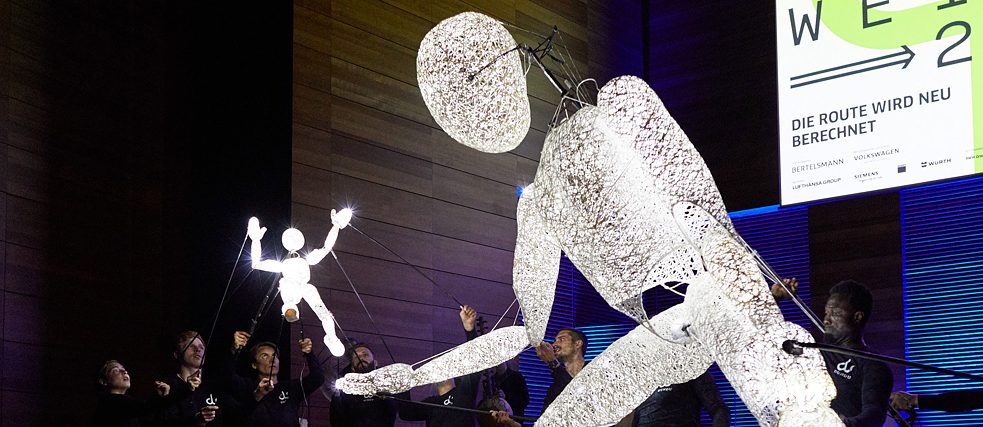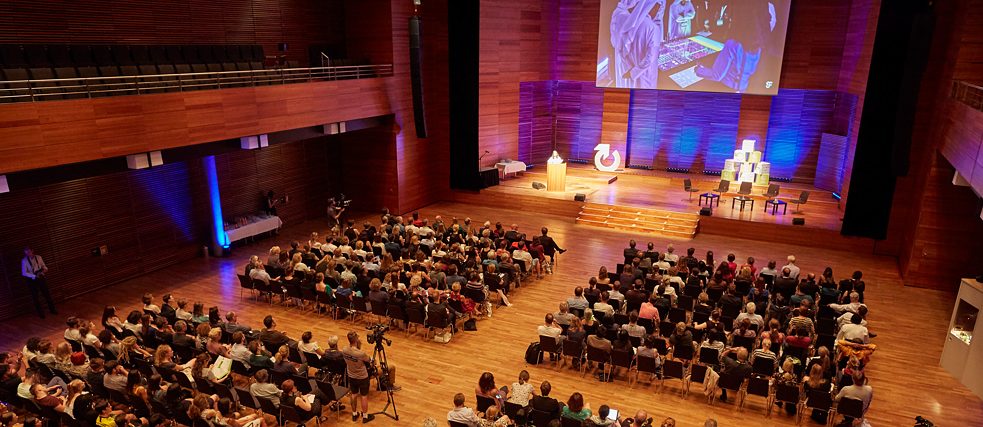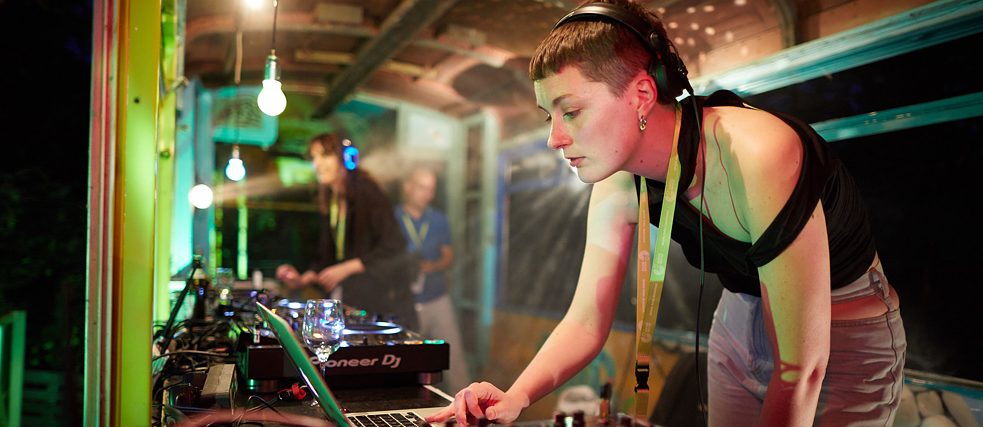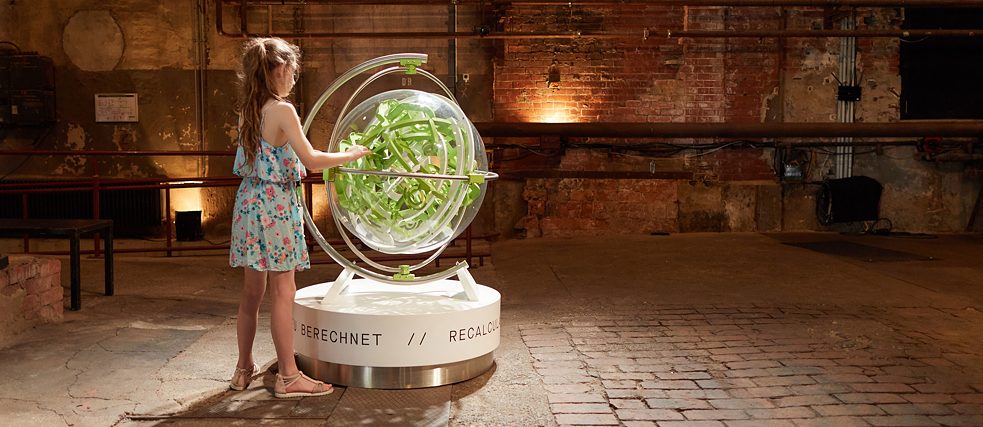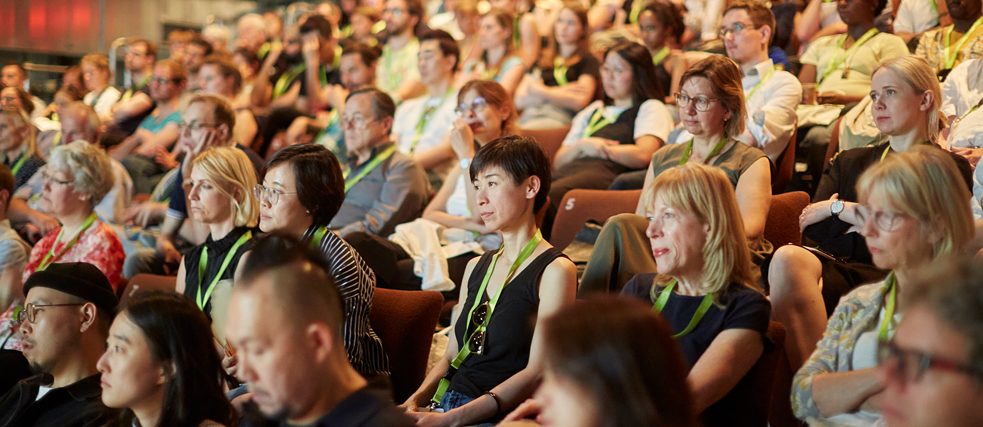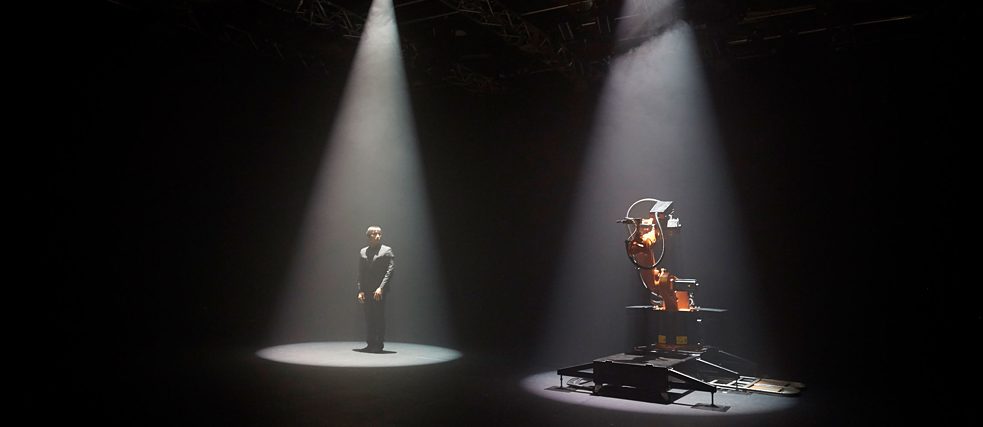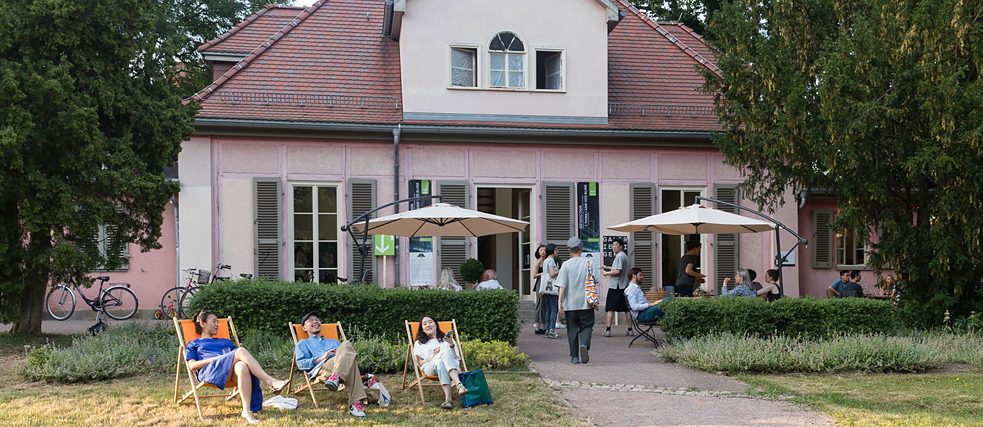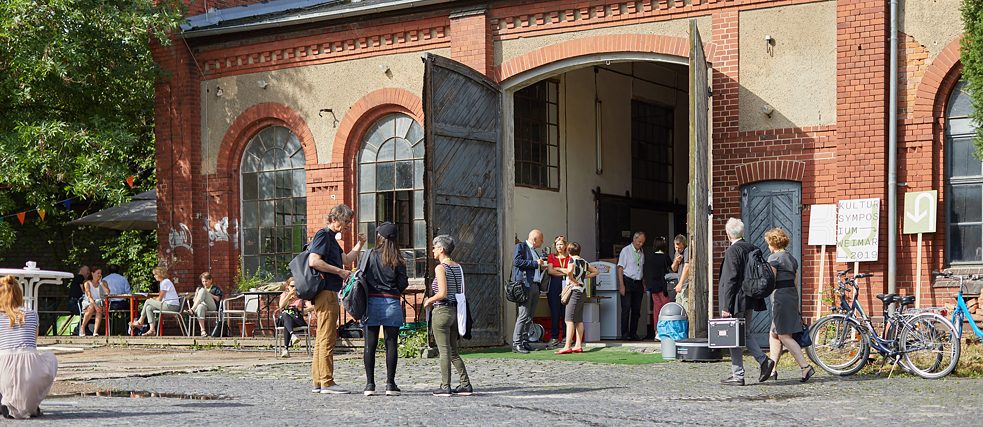Kultursymposium Weimar 2019
Not machines are the problem; it’s people
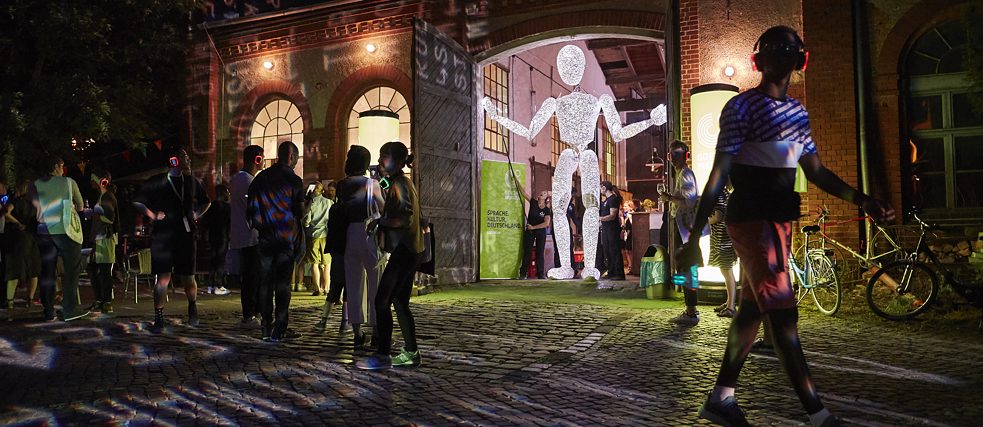
The Giant Dundu, an illuminated limb figure, during the opening evening at the E-Werk Weimar
|
Photo: Jörg Gläscher
The motto of the second Kultursymposium Weimar was “Recalculating the Route.” At the invitation of the Goethe-Institut, experts from all over the world spoke about the issues that are crucial for our future.
By Kirsten Riesselmann
When the Kultursymposium Weimar 2019 opens on Wednesday, 19 June, it’s stifling hot. People come from all directions with suitcases and backpacks, many holding their smartphones to be guided by GPS. On the sun-scorched square in front of the Weimarhalle you can hear the devices saying, “You have reached your destination.”
Gathering cumulative global knowledge
The prelude is quite light-footed and poetic: Baby Dundu and Giant Dundu, a small and a very large articulated figure, delicately built of white synthetic fibres and guided on rods by puppeteers, stride, run and jump through the hall. Then Klaus-Dieter Lehmann, the president of the Goethe-Institut, welcomes the more than 500 participants from 70 countries. He hopes that the variety of perspectives represented in Weimar will make the present and future conceivable not only as a risk but also as an opportunity. The symposium wants to “gather cumulative global knowledge and perhaps find a few answers,” but also to provide a few “stimulating, exciting and enjoyable days.”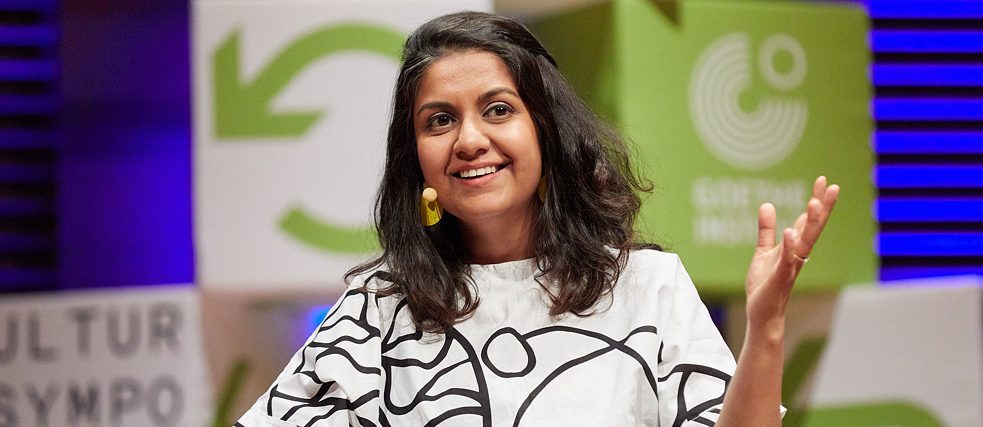 Designer Anab Jain
| Photo: Bernhard Ludewig
Designer Anab Jain
| Photo: Bernhard Ludewig
Bad air
In her subsequent keynote, “Why I build future scenarios,” designer Anab Jain – who described herself as an “archaeologist of the future” – presented her way of dealing with the feeling of powerlessness and being overwhelmed in the face of excessive information, deep fakes, shaky truths and deceptive glossy surfaces. She makes the consequences of our actions physically tangible, makes us feel how today’s decisions affect tomorrow. For example, she blew samples of air into the faces of traffic planners in Dubai: the air they will have to breathe in 2030 if the Emirate doesn’t reduce the numbers of cars on the streets. Dubai is now pushing for Metro expansion and electro-mobility.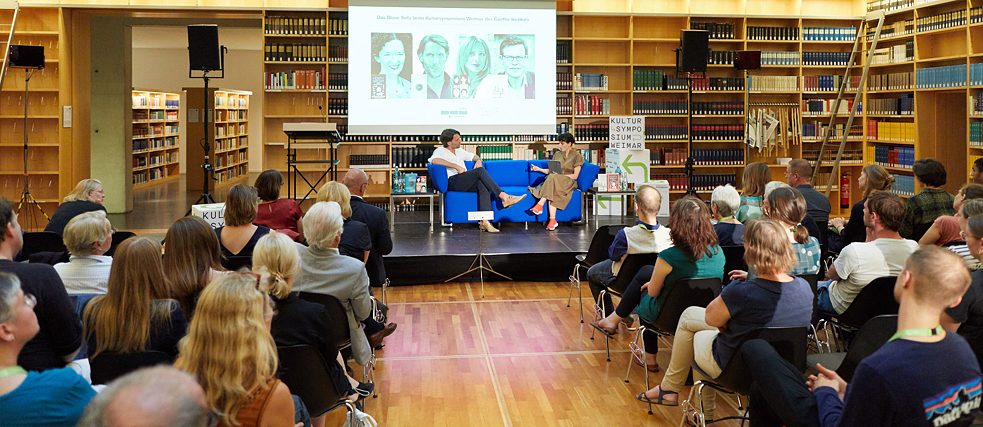 “The Blue Sofa” with philosopher and author Philipp Hübl at the Kultursymposium
| Photo: Bernhard Ludewig
“The Blue Sofa” with philosopher and author Philipp Hübl at the Kultursymposium
| Photo: Bernhard Ludewig
Leap in and be open
Over the next two days, participants made their way through the fifty or so symposium events, dashing on rental bikes from the E-Werk to the Bauhaus University and on to the Study Centre at the Herzogin Anna Amalia Library. Over and over again they pored over the jam-packed programme organised by four themes – “ORIENT//ATION,” “AUTO//NOMY,” “RE//GRESSION” and “DIGI//NOMICS” –, conversed about what they’d just heard during the often too short coffee breaks and asked others what they’d missed. “Were you at the talk about chimpanzees and how they see the world?” “How was ‘The Future of Work’?” “Who’s coming to the human-robot dance performance tonight?” Often there was no choice but to leap in and be open, even and especially among all the doom and gloom that had to be negotiated. But to also firmly believe – and experience – how mutually searching for solutions provides relief and insight enough.Conflict as dialogue
The circumstances described by two theatre-makers and an artist in the “Cultural Policy Under Pressure” panel from PiS Poland, Bolsonaro’s Brazil and Duterte’s Philippines were all depressing. They described how quickly absolutistic values, Christian fundamentalism, policies clearly divided into black and white can suppress oppositional voices, how quickly hostilities towards art and intellectuals can take on menacing proportions, also how quickly experimentation and criticism fall victim to self-censorship. Marta Keil from Warsaw and Antônio Araujó from São Paulo agreed despite scepticism that the job of the cultural scene in such situations is to determine a common ground from which to talk to one another, to seek out contact with opponents and to find a frame that makes conflict possible as dialogue. The Taiwanese dancer, choreographer and video artist Huang Yi
| Photo: Jörg Gläscher
The Taiwanese dancer, choreographer and video artist Huang Yi
| Photo: Jörg Gläscher
Capitalism vs. democracy
The global crisis of democracy was also the focus of Pankaj Mishra, the author of the book Age of Anger, who explored right-wing populism as a response to feelings of being left economically and technologically behind. In the Audimax of the Bauhaus University, Mishra explained the contradictory goals of capitalism and democracy: Democracy wants everyone to be equal; capitalism doesn’t, because only unequal economic development is profitable. When populism makes use of those who’ve been disenfranchised by capitalism to generate democratic majorities and then invoke authoritarianism against the democratic ideal of equality, liberal democracy has hardly a chance. The constitutionalist Ece Göztepe had a proposal for its salvation: The social media apparently don’t create the kind of publicity necessary for a true democracy, so it would have to be regained. In this regard Mishra hoped for “fresh ideas,” which will emerge when people see the future as less rosy than the present. So, very soon.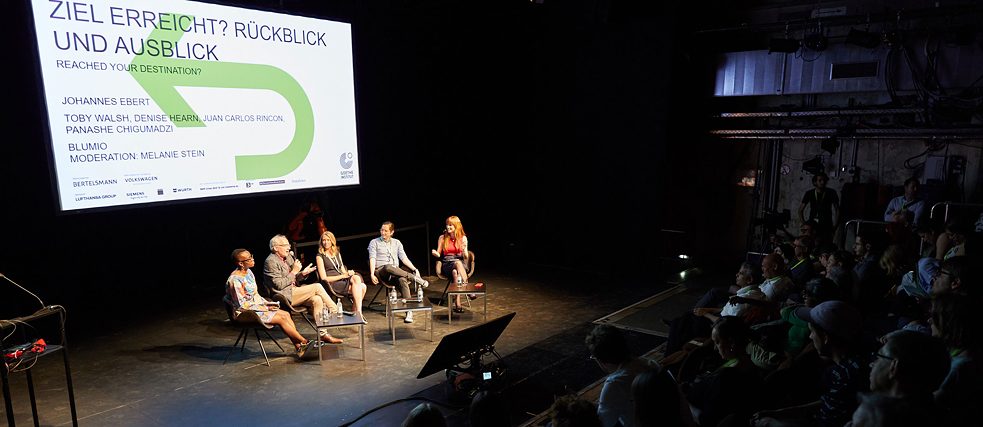 Closing panel with Blumio, Panashe Chigumadzi, Denise Hearn, Juan Carlos Rincon, Toby Walsh and moderator Melanie Stein
| Photo: Bernhard Ludewig
Closing panel with Blumio, Panashe Chigumadzi, Denise Hearn, Juan Carlos Rincon, Toby Walsh and moderator Melanie Stein
| Photo: Bernhard Ludewig
Frightened and yet inspired
During the closing panel, the moderator asked, “Have we reached our destination?” and asked each of the four panel members to make a final statement. The essayist and novelist Panashe Chigumadzi from Zimbabwe, journalist Juan Carlos Rincón from Colombia, Denise Hearn and Toby Walsh attempted the almost impossible and put together a colourful potpourri of topics and approaches discussed during the days in Weimar. A case was made for a Green New Deal informed by post-colonialism and for the opportunities of socially sustainable development through the use of indigenous knowledge. A defense was made for machines: after all, they’re not the problem, but the people behind them. New forms of effective communication were invoked that bring hate, rabble-rousing and misrepresentation to their knees. Like a picture puzzle, optimism tipped into pessimism and back again. Rincón offered what was probably the best summary, saying, “I was both inspired and frightened here. But I think we can look to the future with good cheer. We just have to stay committed and watchful.”On that note, cheers went up at the end when Goethe’s secretary-general Johannes Ebert announced they would meet again in Weimar in 2021. Many will find their way here without their smartphone. Or they’ll have discovered the fun of getting lost and arriving anyway. Or they’ll know that you can just ask people on the street the way.
